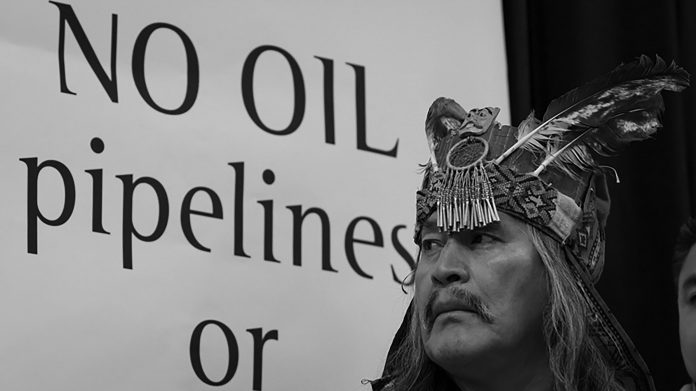
Indigenous leaders hailed the revocation of permits for Enbridge Inc.’s Northern Gateway oil pipeline through British Columbia as a victory for adequate consultation.
While the project could still go on, it will not do so without thorough consultation with the First Nations who have opposed it as an environmental menace. The case had been brought in October 2015 by Gitxaala Nation, Gita’at First Nation, Haida Nation, Kitasoo Xai’Xais Band, Heiltsuk Tribal Council, and the Nadleh Whut’en and Nak’az-dli Whut’en.
“This decision reinforces, yet again, that First Nations have rights as peoples that are recognized in the Constitution and that full and meaningful consultations with affected First Nations must be undertaken and respected by all, including the Federal Cabinet,” said Assembly of First Nations National Chief Perry Bellegarde. “First Nations must be involved from the very beginning of any proposed projects or activities. This is why the U.N. Declaration on the Rights of Indigenous Peoples is the path that must guide our way forward. It will ensure our peoples and our rights are respected and upheld. This standard must be met across the board.”
Other indigenous leaders concurred.
“For years First Nations have called for meaningful and comprehensive consultations to ensure First Nation interests and concerns with respect to the environment are met when government and industry are planning projects that cross through our traditional Treaty territories,” said Federation of Sovereign Indian Nations Chief Bobby Cameron in a statement. “When will governments realize and accept that First Nations must be included especially in the area of natural resources and its development.”
The $6.5 billion project was first approved in 2014, but had to meet 209 conditions, one of which was to begin construction by the end of 2016. Following the approval of the 730-mile-long pipeline that would carry bitumen from Bruderheim, Alberta, to the deep-water port of Kitimat, British Columbia, a massive opposition effort backed by both aboriginal and non-aboriginal communities created major obstacles for the proponents.
Indigenous Peoples said this decision will reverberate throughout other treaties and issues regarding consultation and land rights.
Chief Bobby Cameron further commented : “Last week’s Federal Court of Appeal ruling is another legal example of the affirmation of our Inherent and Treaty Rights to the land. This legal decision also supports the First Nation claim that the 1930 Natural Resources Transfer Agreement was completed without proper consultation with the Inherent right holders to the land, First Nations. ”
The groups, concerned about the impact that a potential crude oil spill would have on sensitive areas of British Columbia’s environment, had managed to delay construction enough that it may not begin before the deadline. The court challenge launched by the Gitga’at and Coastal First Nations was just one of many tying up the project since the federal government’s pipeline approval. In May the Supreme Court of British Columbia ordered the provincial government and Enbridge to pay First Nations’ legal costs of more than $230,000, a ruling that Kelly Russ, Chair of Coastal First Nation, CFN, said validated the communities’ endless dedication to the protection of the Great Bear Rainforest and their ancestral territories along the northern reaches of B.C.’s remote coast.
“We are very pleased with the decision,” Russ said in a statement released by CFN regarding the court-fees ruling. “The decision is a victory for the tireless work of our leaders and our Gitga’at community in the fight to protect the waters, lands and resources in the Great Bear Rainforest.”
In that ruling, perhaps a harbinger to the June 30 decision, Justice Marvyn Koenigsberg found that the provincial government failed to fulfill its statutory duty to properly consult with coastal First Nation communities after signing an Equivalency Agreement with the federal Conservatives, granting the National Energy Board full jurisdiction over the project’s environmental assessment.
After that ruling, Northern Gateway President John Carruthers acknowledged Enbridge’s failure to properly consult all the parties concerned with Northern Gateway, especially those on British Columbia’s north coast.
“Northern Gateway should have done a better job of building relationships with First Nations and Métis communities, particularly on the west coast of British Columbia,” Carruthers said. “While we had the right intentions, we should have done a better job of listening and fostering these critical relationships and developing our plans together as true partners.”
Source:Daniel Mesec





